THE “RUS” OF UKRAINE BEING RUSSIAN IS A PUTINESQUE FICTION
If the 'Rus' of modern Ukraine are Russian, so are the Turks, Hungarians, American Natives and Eskimos
ANCIENT ROMAN CITY AQUINCUM, BUDAPEST, HUNGARY- Lic: WIKIMEDIA COMMONS
The Kremlin’s attempted obliteration of Ukraine and Ukrainian society, shattering its peace and freedom, is an assault on the international order and European existence.
It trespasses treaties, civilized behavior, war-making norms, and international justice.
We need to dispose of Russia’s invention under which the Kremlin is waging war. The notion of Ukrainians being “Russian.” This is based on the tenacious fiction that the ancient Russian people, then called “Rus,” originated in Ukraine (which may be true, but a non-sequitur nevertheless – beside the point). Based on this quasi-historical and cultural connection, the logic suggests that Ukraine is in fact, Russia, and it is not a sovereign state.
This premise makes the Ukrainians’ governing of Ukraine illegitimate based on mythical creatures, the very same way the Aryan Race of the German myth was based on mythical creatures who didn’t exist in Europe. Except for the Finn, who are actually Russians, or Mongols, or Turks – as you’ll see the logic develop below.
Turkic tribes, meaning Turkish and some other people, came from Persia, and later the southern Russian steppes. So have Mongols, Chechens, Tartars, Kazakhs, and from the northern steppe, the Magyars - Hungarians - as well as the peoples of the Emerald Isles. As well as, the American Native. Arguably, the same can be said of the Finn. Finn and Hungarian share the same lingual roots. Moreover, the geographic proximity of Finland, as well as the physical appearance of Finns and Russians in the areas around St. Petersburg for example, resemble each other. Put another way, the Nordic gene, blond with pale skin, light eyes, and the racial makeup of the southern steppe, dark, Asian, cannot both be Russian, can they?
They can…on a continent with no borders during times of ancient nomadic migrations.
Putin’s reinvention of Russian mythology ignored the movement of ancient peoples. The Russians are actually Finns, and Finland might just attack Russia to take its people and land back. By next Thursday the latest.
In the illustration seen at top is the Roman city Aquincum at the outskirts of Budapest. Are Hungarians therefore Romans? Not even close.
For example, Jews IN THE SERVICE OF CESAR arrived on the heels of the Roman armies (having distinguished themselves as Rome’s best soldiers) that conquered Europe 800 years before the Magyars settled the Carpathian Basin, are Romans, and later, Hungarians.
In other words, Cesar’s Jews who settled Hungary before the Magyar tribes arrived are Hungary’s native people. The Romans left, the Jews stayed.
Given the myth of the ancient Rus giving an expansionist Russia justification to take that sovereign nation by force against the wishes of Ukraine’s citizens and an international community that wants none of it, Putin’s war lacks lawful force. In Russiafied minds, the Rus are not Ukrainians anyway, but dissident, separatist Russians, and Ukraine doesn’t even exist. Even if both nations are Russian. Or Rus. Take your pick.
Extending Putin’s “logic,” the Turks and Hungarians – and the American Native and Eskimo, are also Russian. Putin can therefore invade Hungary too, the same way his predecessors have.
Everyone’s a Russian it seems – and, as we all know, Adam Schiff sees Russians everywhere.
The Ukrainians are no more “Rus,” or Russian, just because of similar cultural characteristics, than the American Native, the Turk, and the Hungarian. And Putin’s fictions aside, Ukraine is a real country, independent since 1917, with its own culture and dreams it does not share with Russia.
The Rus no longer exist, and neither do unicorns.
FURTHER READING: MEDIA SPREADS FALSE INFORMATION ON RUSSIA AND TRUMP “AFFINITY” TO MISLEAD THE PUBLIC
© ALL RIGHTS RESERVED
—
Andrew G. Benjamin is in finance, real estate and equities, a former advisor to New York City mayor ‘s office (Subcommittee on Taxation, Finance and the Budget). Benjamin wrote extensively about politics, transnational and domestic, intelligence and military affairs, security and strategy, economic issues, Mideast, terrorism, technology and high end audio.
Reprint rights are available from the author.



